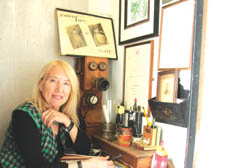|
|
 |
| |

Founder Leoni Scott-Matthews at her desk in Pentameters. |
Camden feature | Leoni Scott-Matthews | review | Pentameters Theatre | Poets 1968 revolution
1968, and radical students in Paris are clashing with police; closer to home, writes Simon Wroe, a group of poets start their own revolution
IN the summer of 1968, as the spirit of revolution raged in Paris, a group of poets, artists and musicians gathered beneath the cobblestones of Hampstead.
Their inaugural meeting took place in the basement of The Freemason’s Arms in Devonshire Hill; they could use the old bowling alley, the landlord had said, for the sum of one pound.
There, in a narrow, windowless room, thick with the smoke of joss-sticks and cigarettes, a crowd in hipster pants and bell-bottom flares sat on the dusty wood floor and listened as two little-known poets called Dannie Abse and John Heath Stubbs stood on the spot reserved for skittles to read their work. The next week Rosemary Tonks took their place. The third week it had a name: Pentameters.
Forty years on, Hampstead has changed significantly. Estate agents nuzzle mobile phone retailers, mega-chain coffee shops are pandemic. But the spirit of Pentameters exemplified by those first chthonic “happenings” is alive and well. It has, of course, long outgrown its first location. (The landlord, annoyed by the number of beatniks traipsing down to his cellar every week, revoked the agreement after just a few months.)
Today Pentameters sits above The Three Horseshoes pub in Heath Street, as it has done for the past 39 years. Besides continuing to serve as a platform for musicians and artists, it is also the oldest fringe theatre in London, celebrating its 40th anniversary this year.
Harold Pinter, Ted Hughes, Nigel Havers, William Empson, Stevie Smith, WS Graham, RD Laing and Ben Elton have all made appearances on its stage.
Dannie Abse, Michael Horowitz and Alan Brownjohn are regular contributors, while the poet Donald Gardner still comes over from Holland to read.
It’s an impressive list for any venue – but for a small, dark, ramshackle outfit with a corridor for back stage and an old labrador roaming around front of house, it is quite incredible.
The little theatre, which remains owned and run by its founder, Leoni Scott-Matthews, has had its share of trials and tribulations. Leoni had to squat in the building in the late 1980s to ensure her rights after the pub downstairs closed.
Even when one of the ceilings collapsed, the shows went on. Critics who attended one production had to tiptoe through a building site, side-stepping cement mixers to get into the auditorium. On another occasion the blind poet John Heath Stubbs caught fire during a candle-lit reading. A fellow poet, Eddie Linden, leaped on stage and put him out with a jacket.
“For all its difficulties, this little room allows such creativity,” says director and actor Harry Meacher.
“The atmosphere you create here is like no other theatre anywhere. You’re completely related to the audience. It allows complete artistic freedom, short of pulling down the theatre.”
Like everybody you speak to about Pentameters, Meacher has a story to tell. One night during a performance of The Three Sisters, a large lady in the audience had an epileptic seizure. The quick-thinking producer dragged her backstage, a space roughly 2ft wide, where she remained unconscious; the actors had to spend the rest of the performance climbing over her to get to the stage.
The actress Judi Bowker adds: “It’s a great training ground for young actors. All the good and bad come up into focus.
“Leoni has resisted to the hilt any attempt to commercialise it, because she knows what she has here would be lost.”
Most, when questioned, attribute Pentameters’ success to Leoni. “Poetry requires a living audience as much as it requires readers, and Pentameters has always been a place where you would come and know there are people who want to hear poetry,” says the poet Alan Brownjohn.
“The atmosphere is informal, yet businesslike. You wish you read better than you had, but there you go.”
Dannie Abse agrees: “It’s always a good place to read. I don’t think it’s really changed at all. If Leoni asks you to read, you just obey.”
Leoni was born in Guernsey in 1941, the daughter of an actress. Her father was a frustrated musician who worked at Lloyd’s bank. She came to London aged 18 to attend the Royal Academy of Music and soon fell in love with Hampstead. In 1963, she discovered artists’ hangout The Rosslyn Arms.
She decided she would devote her life to “literature, poetry and theatre” and, alongside odd spots of acting and performance, she founded the poetry evening which would give birth to Pentameters.
She is firm about preserving “the ethics of the place”, which she feels have evolved over the years.
“People love to come here because they’re made to feel an individual. There are very few places you can do that now,” she adds.
“Leoni’s always been brilliant at public relations,” reasons the poet and writer John Horder, who has advised her on poets for her readings since the very first in the Freemason’s cellar. “She’s given a lot of people their first opportunity and she’s always kept up with people from the early days.”
The theatre has treasures, he says, that are yet to be unearthed. Since Leoni doesn’t throw anything away, hidden among the patchwork pillows and disused props is an “incredible archive” of letters and poems from many of the country’s greatest writers. Whether it is ever properly collated is part of Pentameters’ unique and unruly charm.
|
 |
|
 |
 |
|
 |
|



